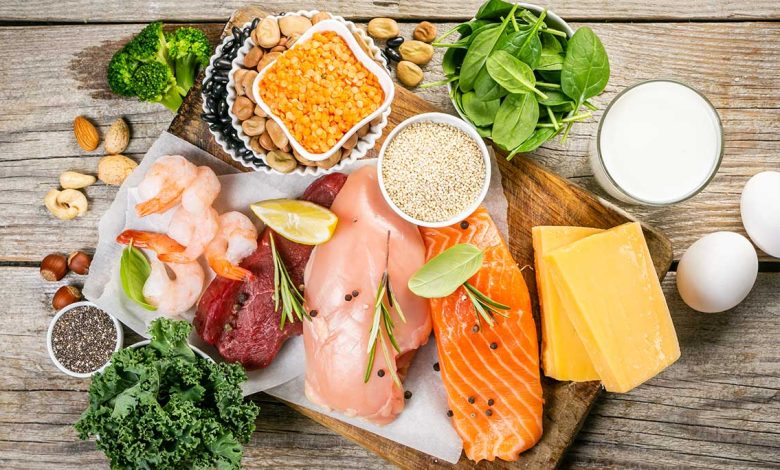How much protein should I eat?

It is not always easy to prepare your body when it comes to the calculation of your nutrient intake. You may ask this question very often- how much protein should I eat to gain muscle? Few nutrients are as important as protein. Not getting enough of it can create health issues with the body. However, the intake of protein you have per day may vary greatly. Most organizations recommend a moderate intake of protein. But, as per the standards, the DRI (Dietary Reference Intake) is around 0.36 grams of protein per pound, i.e, 0.8 grams per kg of body weight. This much protein is enough to prevent deficiency in the human body. However, if you or anyone you know is going through an underlying deficiency of protein intake, you can consult the doctors of Aster Prime Hospital.
Why is it important to have protein in daily meals?
Proteins are the building blocks of the human body. Those who understand the importance of protein intake will surely be healthy and fit. In reality, proteins are used to have muscle growth, growth of tendons, organs, skin, enzymes, hormones, and other neurotransmitter senses or molecules. Protein intake is important as much as it is important to have a meal in the daytime or have breakfast in the morning.
- Protein consists of smaller molecules called amino acids. These amino acids together form thread-like beads on any string. They get linked and form a long protein chain. Proteins can fold themselves and are the complex chains of amino acids.
- The human body requires some amount of protein or amino acids which are known as essential amino acids. Proteins are not only important to take from a quantity point of view but also to enhance the quality.
- In general, animal proteins are the essential amino acids that provide you with the full ratio of protein intake. This is the reason when you go to the gym, your instructor advises you to have a chicken soup that is healthy and light in protein intake.
- If you are consuming products like eggs, fish, dairy products every day, you are likely to get enough protein.
- However, if you do not eat animal food, fulfilling the body’s needs in terms of protein intake can be cumbersome. You may require to eat at least three or four times including items like soya, or other vegetables to fulfill the body’s need for protein compared to animal product consumption.
- Few people recommend taking protein supplements. This is recommended generally for bodybuilders and athletes.
How much protein should I eat to gain muscle?
Protein can help you prevent eight loss and weight gain. Protein helps you maintain constant body weight. It is an important source when you are about to lose excessive weight. To burn fat, you may require to work on your calorie intake. However, it is advisable that protein increases your calorie intake and burns calories by boosting your metabolic rate. Thus, protein helps to lose appetite that further forms an intake of calories. This way protein helps to maintain the calorie intake and out cycle.
- Consuming at least 25-30% of daily calories with the help of protein intake can boost your metabolic rate by 80-100% compared to low protein diets.
- Protein is one of the important contributions that help to prevent weight loss. Also, you may likely reduce appetite by having continuous protein intake or that may lead to calorie reduction. Protein provides you with a better collection of fat, or carbs and makes you feel full
- Consuming at least 25% of protein per day can increase calorie intake and can make you have the feeling of fullness. It can reduce the urge to have any food or meal during evening snack time or late night snacking desires. You can reduce your dependence on obsessive food by 50-60%.
- This way if you continue to take protein at least for 12 weeks, you can increase the calorie intake by 30% i.e, nearly 441 fewer calories per day. This may help you reduce at least 11 pounds or 5 kg. You just only need to add simple consumption of protein intake to your diet.
Protein intake can help in weight loss
If you consume 15-18% of calories per day, you can reduce a considerable amount of fat after losing weight by 50%. A high protein intake may help you build muscles, preserve muscle mass and burn the small calories around the clock. Eating protein and managing weight is easier than sticking to unhealthy or healthy meals to manage body weight. Be it higher in carbs, or low in carbs, it can help you manage your body mass. Also, a protein intake that is 30% of the optimal calories is responsible for weight loss. This amounts to at least 150 grams of protein that you should take for the management of a 2,000 calorie diet. You can manage your calorie intake along with the ratio of protein intake by using any reliable calculator.
Protein helps you gain muscle and strength
Muscles are made of protein (in greater amounts). Muscles remain at the continuous stage of wear or tear with everyday routine work. To gain muscles you must synthesize the muscle protein that it breaks down continuously. In other words, there should be a positive intake of protein balance in your body. This balance is known as nitrogen balance because protein consists of a great amount of nitrogen.
How much protein should I eat to gain muscle? This question might disturb you very often but, here we have come with a reliable answer.
People who are required to build their bodies may require continuous consumption of protein.
Meanwhile, those who maintain muscle mass may require an increased amount of protein intake. This is necessary for the situation of losing body fat. Protein can help you prevent muscle loss especially when you are on your diet.
When it comes to muscle mass, do not look at the calorie intake that you are getting in return for your protein gain. Rather, you should work on your protein intake in grams. It is advisable that protein should be the same amount (in grams) according to your body weight (in kilograms).
A common recommendation is that a normal human body requires at least 1 gram of protein per pound (or per 2.2 grams per kg) of your body weight.
Others suggest that you must have a minimum of 0.7 grams per pound (1.6 grams per kg) of your body weight.



